 Botswana’s Okavanga Delta: A Real Paradise on Earth
Botswana’s Okavanga Delta: A Real Paradise on Earth
By Irving Spitz
|
Solitary leopard with its kill
|
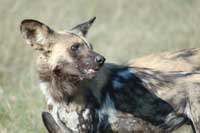 |
African wild dog |
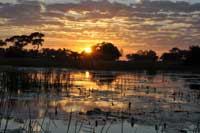 |
Sunrise from the guest area at Xarrana camp |
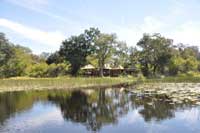 |
Bungalow at Xaranna camp |
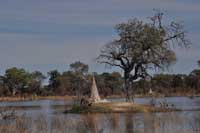 |
Mound constructed by termites, one of the essential players in the ecosystem |
 |
Frog on a reed in a lagoon from a mekoro boat |
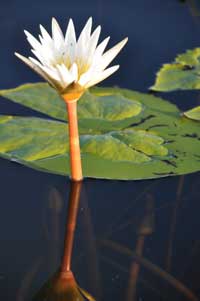 |
| Water lilies |
Botswana is one of the few places left in Africa where large numbers of wildlife roam free through unfenced wilderness areas. Initially a British protectorate, Botswana achieved independence in 1966. At that time, it was one of the most impoverished countries in Africa, but Botswana has since transformed itself to a middle-income country with a stable political system and a rapidly developing market economy. Eighty percent of the population is rural.
Geographically it is landlocked and bordered by South Africa, Namibia, Zimbabwe, and Zambia. It is approximately the size of France, but has a population of only 1.8 million. Seventeen percent of Botswana consists of national parks and game reserves. The Kalahari Desert, which makes up 70 percent of its land surface, is the largest continuous stretch of sand in the world. Situated in the northwest of the country is the Okavango Delta, the world's largest inland delta. Its source, the Okavanga River, arises in the distant central highlands of Angola. After traversing through Namibia, it enters Botswana. Initially the river flowed into a vast inland lake before emptying into the Indian Ocean. However, subtle changes in the earth’s crust over millions of years cut off the route to the sea. Thus, the Okavanga is one of the few major rivers in the world that is totally divorced from an ocean-bound river system. Instead, its waters empty into the sands of the Kalahari Desert, forming a maze of channels, resulting in a permanent swamp. There is also a seasonal swamp in an extensive area that is flooded annually. Vegetation, mostly tall papyrus and grass, flanks the channels. In some places the channels open up to form lagoons, which support water lilies. The purity of the Okavanga waters creates mirror-like reflections of clouds, reeds and sky. This vast area of secluded waterways, papyrus, thickly wooded islands, and stupendous wildlife is one of the major wilderness attractions of Africa.
Roads in Botswana, particularly in the delta, are generally only accessible by four-wheel drive and, in the wet season, are often not negotiable and barely passable. Because of this, the delta remains wild and relatively unpopulated. Only a few sandy tracks and isolated campsites disturb the pristine nature of these areas. The only practical form of transportation is by small plane.
The delta is host to vast numbers of game and bird species. The annual rains and flooding ensure adequate water supply to the animals living in this lush paradise with abundant vegetation in the midst of a desert. There are large populations of elephants, buffalos, baboons, hippos, cheetahs, lions, leopards, wildebeest, and many species of antelope and birds. It is one of the last strongholds of the African wild dog, considered to be one of the continent's most endangered carnivores. The most stealthy and secretive of the big cats is the leopard. These magnificent animals are solitary; males and females live in different defined territories and only come together to mate. Lions, in contrast, are the only truly social members of the cat family. A pride typically consists of five adult males with their offspring and two males to ward off competitors.
Of all of the wildlife, three species are particularly essential to the ecosystem. First is the large African elephant. A single elephant will consume up to 300 kg of vegetation every 24 hours. Many other species are dependent on modifications brought about by these animals. The bare and brittle branches left by the elephant provide nesting for a host of birds. Broken branches on the ground are consumed by millions of termites. Droppings (about 30 Kg per day) attract bacteria, insects and worms, making for high quality compost. In addition, ingested seeds excreted in their droppings serve to propagate the vegetation.
The second animal crucial to the ecosystem is the hippopotamus, one of the heaviest land mammals. Emerging from the water at night, hippos take the same course daily, leveling the grass and creating channels, allowing water to flow. Returning to defecate in the water during the day, the hippo fertilizes the aquatic habitat by providing essential nutrients.
Finally, termites play a crucial role in shaping the savanna ecosystems as well. These industrious creatures build tall spire-like moulds, which are seen all over the delta. The raised ground that they create is the starting point for bush clumps and island formation. Each year the mounds get a little larger, as silt deposits build up on the fringes. Eventually, two or more raised mounds may become bridges, creating the beginnings of a new island.
Our touring arrangements to this fascinating country were made by &BEYOND, an international, high-end company recognized globally as one of the world's pioneering luxury ecotourism companies. &BEYOND owns and operates nearly 50 luxury lodges and camps. The majority of them are in Africa, but their operation has recently expanded into India and Central and South America. In addition, &BEYOND has established a foundation, which focuses on projects to empower communities neighboring their reserves. This foundation has implemented numerous projects to support education and health care.
The company operates four luxury camping lodges (Sandebi, Nxabega, Xaranna, and Xudum) in private concessions situated in the heart of the delta, with their own private landing strips. Xaranna and Xudum are situated on lagoons, and Xaranna is only accessible by boat. All lodges have sweeping views of the vast plains or channels and lagoons. Each lodge has eight to nine sleek, luxury, ensuite African-inspired cottages or luxury safari tents with breathtaking views over the channel. Most have elevated viewing decks, perfect for observing the delta, as well as for intimate candlelit dinners. In some of the lodges, each suite boasts a private plunge pool. The intimate guest sitting area comprises a spacious reading area, and many dining areas feature shady verandas overlooking the channels of the delta. These guest areas are all positioned carefully to maximize the sweeping views. All serve delicious Pan-African meals, bush breakfasts and elegant bush dinners. There is a full compliment of knowledgeable rangers in each lodge. The ratio of guests to staff is in the range of 2:5.
Each lodge operates game drives in the morning as well as the afternoon/early evening in open safari vehicles as well as guided bush walks, bird watching tours, and mokoro (traditional dugout canoe) excursions in the delta. The mekoro dugout canoes used at the lodges are replicas of those that allowed many of the tribes to explore and survive in the delta. The pace of the mekoro excursions is much gentler, allowing time to appreciate the small wonders and the spectacular delta scenery. A stop is made on each bush drive for cocktails.
There is perhaps nothing more beautiful and satisfying than sipping a beer on the veranda of an &Beyond lodge, staring across a lagoon into the magnificent hues of a sunset. It is no wonder that Botswana’s popularity as a major tourist destination is growing in leaps and bounds. This is a real paradise on earth. #
Additional images can be seen at pbase.com/irvspitz
